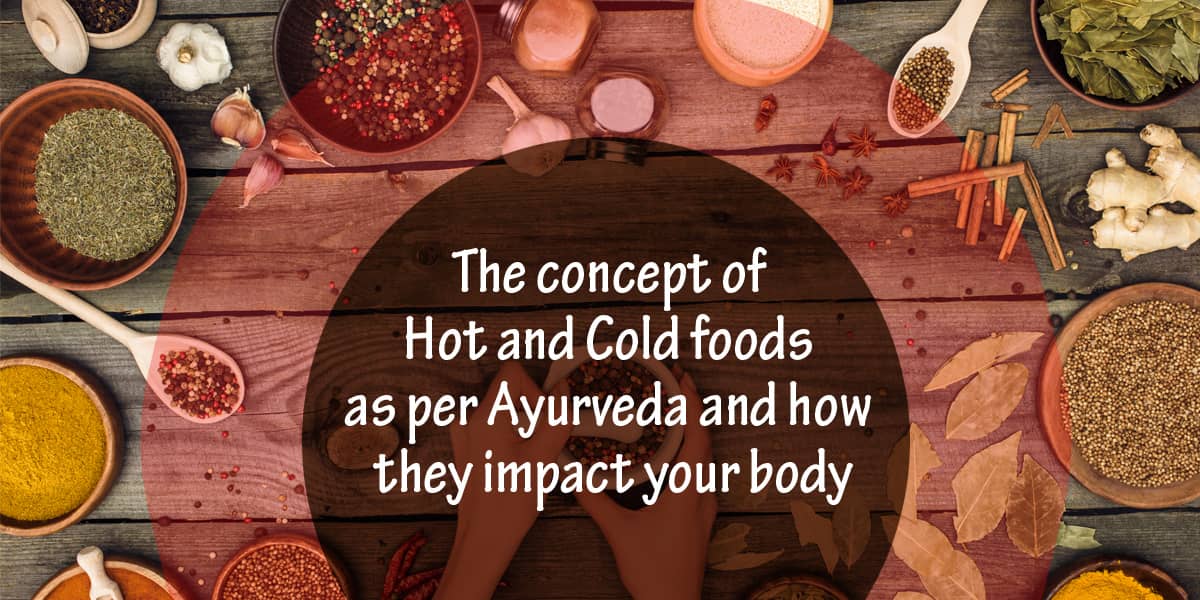When I say choose your hot and cold foods wisely, most people think I am talking about freshly cooked food and refrigerated food.
Well, that’s a common misconception. Ayurveda believes every food has potency.
Foods like tomato, ginger, onions, ghee, pepper, spices, and herbs like Tulsi and mints, are hot in potency and they help in improving digestion and circulation. While foods like melons, coconuts, pumpkins, and sweet fruits are cold in nature that help provide nourishment and strength to the body. In this blog, I will introduce you to the Ayurvedic concept of hot and cold foods that will help you eat right!
According to Ayurveda the nature of our body plays a crucial role in determining the diet. Each individual has a different body type. It constitutes of 3 basic doshas viz. Vata, Kapha, and Pitta. And different body types are affected in different ways by the choice of hot and cold foods. Someone may get a burning sensation or stomach issues when they consume excess hot foods while for some it might be their regular diet.
Hence, to design a healthy balanced diet, it is essential to note the body type and understand the good, bad and ugly effects of different food types. Ayurveda says that ignoring this crucial match could make one more susceptible to diseases.
Also Read: Intuitive Eating – The art of eating right
What are hot potency foods?
Hot potency foods ignite your digestion and boost your metabolism. It also imparts a feeling of lightness to the body and mind. However, in some, hot potency foods can lead to vomiting, purging, heartburn, and destroy semen quality. Excessive consumption of these foods can lead to gastritis and ulcers. Hot foods are also known to increase appetite and trigger weight gain.
Generally, people think spicy foods are of hot potency. But foods like honey, tomato, dates, cumin are also hot in nature.
Benefits of Hot potency Foods
- Hot potency foods improve blood circulation in the body.
- They support digestion and boost metabolism.
- Hot potency foods are light and energetic.
Side effects of eating too many hot potency foods
- Purging and vomiting
- Ulcers, rashes, and gastritis
- Increase your appetite
- Heartburns
Also Read: How to stop Emotional Eating?
What are cold potency foods?
Cold foods are nourishing and they help in the build-up of fluids in the body. However, cold foods are not suitable for all. In some, eating cold foods can impart a sense of heaviness and sluggishness.
Cold foods help in feeling more nourished, strong, and steady. They help in the build-up of fluids in the body. However, eating cold foods can impart a sense of heaviness to the body. Further, cold foods are harder to digest and can negatively impact the immune system.
Milk, yogurt, green tea, fruits, lettuce, and eggplants are cold in nature!
Benefits of Cold potency Foods
- It nourishes the body.
- It provides strength and steadiness.
- They help to build fluids in the body.
Side effects
- Heaviness.
- Hard to digest.
- Impaired immune system.
Also Read: Does eating late at night makes you gain weight?
Choosing the right foods as per body type
As I already said, every person has a unique Prakriti, defined by a unique combination of three doshas, Vata, Pitta, and Kapha in different ratios. These doshas can be influenced by seasons, location, and emotions.
Pitta
Hot potency foods are not suitable for Pitta constitution people. People with dominant Pitta must avoid fried and spicy foods. Foods of cool potency like mint, melons, mangoes, cherries, avocados, cucumber, coconut, and leafy greens are best for people with Pitta Prakriti.
Vata
People with Vata dosha should consume warm, cooked, and nourishing foods that can be easily digested. Dairy products, vegetables, and fruits are good for them. Beans, zucchini, cauliflower, and sweet potatoes are all good for people dominant in Vata Prakriti.
Kapha
People with Kapha dosha can enjoy light, spicy and warm foods. Spices like black pepper, cumin, ginger, sesame, and turmeric are suitable for Kapha dosha dominant people. Bitter dark green veggies, beans, and pulses are also good choices. Fruits like pears, peaches, figs, pomegranate, and apples also suit Kapha Prakriti people.
Should you eat cold foods?
The great Ayurvedic Vaidya Charaka recommends food should always be consumed hot. It should not be left for a long time after cooking. Stale and cold food is difficult to digest and this results in debris or toxins in the body. The toxins or ama are the root cause of all diseases.
Your Take away!
Food is a natural medicine that has a preventive and curative effect on the body. Choosing the foods according to your constitution induces physical and mental wellbeing. Each ingredient of your food has a cooling or heating effect that affects digestion and metabolism and it affects different body types in different ways. That’s why it’s important to choose the right ingredients to maintain the balance.


1 comment
[…] Concept of hot foods and cold foods in Ayurveda […]